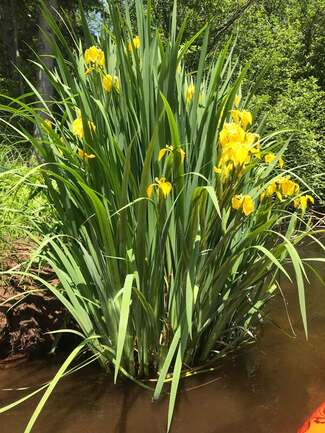 by Melinda Myers For many of us, winter is the start of the gardening season. We are busy browsing catalogs, reading garden articles, and looking for sources of new plants. As the planning process continues, the plant wish list keeps expanding. Once your list is complete and before placing any order online, be sure to check your list for any invasive plants that are prohibited or restricted in Wisconsin. According to the Invasive Species Rule NR40, prohibited plants are those that are not currently found or occur in isolated areas in the state. If introduced into the state, these plants are likely to cause significant economic or environmental harm or harm to human health. Restricted plants according to NR40 are already established in the state causing harm or have the potential to cause significant harm. The ability to spread and vigorous growth habit of the yellow flag Iris (Iris pseudacorus) make this invasive plant a threat to our waterways. Photo credit: photo courtesy of Zach Stewart Although regulations for the sale, purchase and possession of invasive species are in place, some online sellers are not aware, up-to-date, or concerned with following existing state and federal regulations. Just because you can purchase a plant does not mean it is allowed in Wisconsin. So, it is up to us, the individual gardener, to protect our gardens, natural spaces, and waterways.
Many of us purchased plants in the past unaware they would eventually become a problem for native plants, wildlife, and beneficial insects when food sources and nesting sites disappear. Many also negatively impact our waterways, recreational use of spaces, and the economy. Now, we are tasked with paying for and personally eliminating the problem. More research and precautions are being taken to manage existing invasive species and reduce the risk of future problems. As we learn more by observing what is happening in our own and other states, the list of prohibited and restricted plants keeps changing. It is important to visit the Wisconsin Department of Natural Resources website and make any needed changes before placing your plant order. Growing even one or two invasive plants in your garden, shoreline planting or pond can have an impact. Invasive plants tend to be vigorous growers, reproducing faster than our native plants, and more tolerant of adverse conditions. This allows them to quickly spread, take over and cause harm. Not only do these invasive plants disrupt the ecosystem; they have a negative impact on our economy, personal budgets, outdoor recreation, and health. In 2001 an estimated $137 billion dollars were spent in the United States to manage the ecological damage and to control invasive species. These costs have continued to increase each year and many of the expenses are passed on to consumers. It is easy to see the impact of some of the thugs, like Japanese knotweed, that have overrun gardens, landscapes, shorelines and our waterways. New infestations usually occur when soil containing rhizomes of this invasive plant are moved to a new location or washed downstream. Even small root segments only a couple inches long can start a new infestation. The yellow flag Iris (Iris pseudacorus) is an invasive plant masked as an adaptable and beautiful perennial. This beauty seems harmless growing along the shoreline, in the garden or pond. Its ability to spread and vigorous growth habit have made it a threat to our waterways. Seeds or pieces of the rhizome can float away from the planting or be accidentally moved into natural spaces. It quickly adapts to a wide range of growing conditions and forms dense clumps or floating mats that can alter wildlife habitats and the diversity of species. I have teamed up with the UW-Madison Extension Aquatic Invasive Species Outreach Program to help spread the word about aquatic invasive plants. As an influencer in the gardening world, I need your help to reach more gardeners. Many people are not aware of this threat and need our help to make wise plant decisions. Thanks to all of you who are already spreading the word and actively trying to manage invasive terrestrial and aquatic plants. If you are interested in volunteering or need advice to help control invasive plants, email [email protected]. As we work together sharing our passion for gardening and our concern for Wisconsin’s natural spaces, lakes, and waterways, we can make a difference. Melinda Myers is the author of numerous gardening books, including The Garden Book for Wisconsin, Small Space Gardening and The Midwest Gardeners Handbook. She hosts the “How to Grow Anything” DVD series and the Melinda’s Garden Moment TV & radio program. Myers is a columnist and contributing editor for Birds & Blooms magazine. She offers free gardening webinars on her website at www.MelindaMyers.com.
0 Comments
Leave a Reply. |
|
| North Country MGV | gARDEN bLOGS |
Location |
|
 RSS Feed
RSS Feed